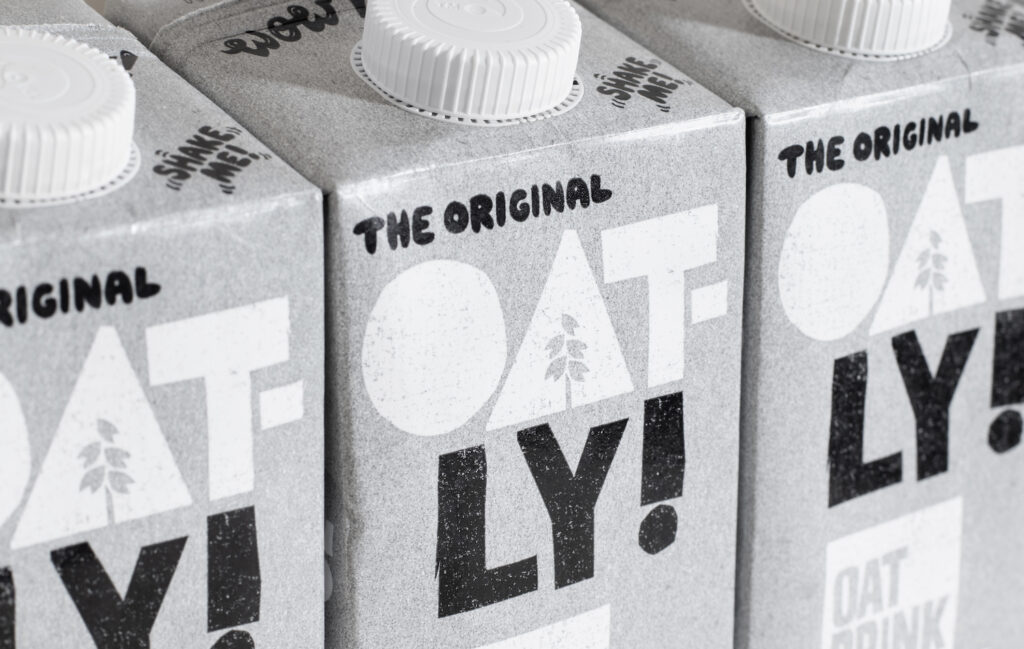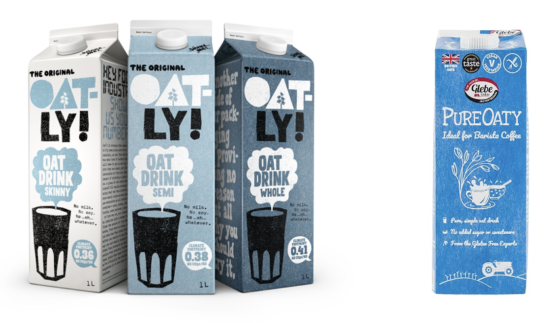Oatly ads banned after watchdog rules them ‘misleading’
27th January 2022
Adverts by the oat drink brand attracted over 100 complaints, with critics raising concerns about the company’s environmental claims.

Stock photo.
Multi-billion-dollar company Oatly has come under fire again as the Advertising Standards Agency (ASA) ruled environmental claims made in its adverts were misleading.
The series of TV, print and social media adverts received 109 complaints questioning Oatly’s data on the environmental impact of its Barista Edition drink, versus cows’ milk. The ASA upheld four out of five of the complaints.
In its ruling it stated: ‘The ads must not appear again in the forms complained about. We told Oatly UK Ltd to ensure that the basis of any environmental claim was made clear, including what parts of the life cycle had been included and which excluded. We also told them to ensure they held adequate evidence to substantiate environmental claims made in their ads as they would be understood by consumers.’
Past controversies
Oatly has come under fire several times over the past year, having been accused of ‘bullying’ when it sued a small Cambridgeshire farm for copyright infringement last year. Oatly’s claim that an oat drink produced by Glebe Farm Foods was too similar in name and packaging to its own left fellow farmers and consumers baffled as they struggled to see the similarity. A judge later dismissed Oatly’s claim.
The company has also been forced to defend its decision to sell a stake of its business to a consortium that includes private equity firm Blackstone. The firm has been linked to a controversial infrastructure development in Brazil, which has been accused of contributing to deforestation in the Amazon.
As well as being accused of “peddling misinformation” on climate impacts, Oatly’s TV ads – one of which showed a dad sneaking into the house with milk and being confronted by his son – also prompted a public backlash in January as critics accused Oatly of ‘dad shaming’.

Last year, Oatly unsuccessfully sued a small Cambridgeshire farm for copyright infringement, claiming the name and packaging were too similar to its own.
What were the statements and what did the ASA say?
A series of five statements from Oatly’s adverts were examined by the ASA, four of which were deemed misleading.
- “Oatly generates 73% less CO2e vs. milk”
The ASA decided that consumers would understand the claim to mean that all Oatly products generated 73% less CO2e compared to any type of cows’ milk, but the evidence only related to the Oatly Barista Edition oat drink.
- “The dairy and meat industries emit more CO2e than all the world’s planes, trains, cars, boats etc., combined. Need help talking to dad about milk? Go to oatly.com/helpdad”
ASA concluded that the claim overstated the emissions coming the meat and dairy industry compared to the transport industry.
The evidence for the environmental impact of the meat and dairy industry took into account the full life cycle, whereas the evidence for the transport industry took into account part of the life cycle; accounting only for the emissions coming directly from using the vehicle.
- “Today, more than 25% of the world’s greenhouse gases are generated by the food industry …”
ASA ruled that this part of the claim was substantiated as it was taken from a comprehensive review and it believed in the context of the advert, consumers would understand that this referred to GHGs caused by human activities only.
However, the second part of the quote: “meat and dairy account for more than half of that”, was deemed misleading. ASA concluded that many consumers would not interpret ‘meat and dairy’ as an all-encompassing term that also included eggs, fish shellfish and other organisms in water environments. Egg and aquaculture industries would have been a significant contributory factor to the GHG figure reported in the evidence, ASA said.
- “Climate experts say cutting dairy and meat products from our diets is the single biggest lifestyle change we can make to reduce our environmental impact”.
This was based on an article by climate expert Joseph Poore who wrote ‘A vegan diet is probably the single biggest way to reduce your impact on planet Earth’. As the evidence provided the opinion of only one climate expert, and the word ‘probably’ had been omitted from the claim, the ad overstated the evidence and was therefore misleading.
- “If everyone in the world adopted a vegan diet, it would reduce food’s annual greenhouse emissions by 6.6bn metric tons (a 49% reduction)”.
This was the only complaint not upheld. ASA said that because the figure was taken from a comprehensive review, the claim had been substantiated and was therefore not misleading to consumers.
Oatly said it commissioned CarbonCloud, independent product life cycle assessment experts, to calculate the emissions of Oatly Barista Edition oat drink and British whole cow’s milk.
However, CarbonCloud used an attributional approach to life cycle accounting, which included emissions and removals of greenhouse gases generated during a product’s life cycle. It did not take into account avoided emissions, actions taken to mitigate released emissions, or carbon offsetting.
